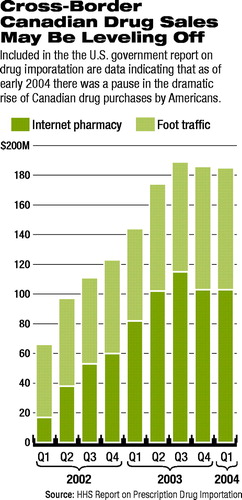Govt. Cites Few Benefits From Legal Drug Imports
Commercial importation of prescription drugs by large wholesalers could be rendered safe under certain stringent criteria, according to a report by the U.S. Department of Health and Human Services (HHS).
But the cost of ensuring safety of imported drugs would be in the hundreds of millions of dollars, while legalized drug importation from price-controlled countries would do little to solve the problem of high drug prices in the U.S. Moreover, legalized importation by wholesalers would likely reduce incentives for research and development of new drugs here in the United States, HHS said.

Meanwhile, the government's report, intended to provide guidance to Congress in considering legislation to legalize drug importation, paints a negative picture of private importation by individuals, saying it would be all but impossible to ensure safety of such imported drugs.
In a press conference on the day the report was released, U.S. Surgeon General Richard Carmona, M.D., said the estimated cost of ensuring safety of privately imported drugs would be about $3 billion.
There are also potentially profound safety issues related to private importation of drugs, the scope of which cannot be gauged since the role of imported drugs in adverse events is likely to be hidden.
“If you have a senior citizen with a heart condition who buys some Internet medications then a week or two later dies of heart failure, it may never be known [if the patient died as a result of the drug],” Carmona said.
But the HHS report did at least suggest that ensuring safety of drugs imported wholesale by large commercial suppliers is feasible—though it would be difficult, costly, and of questionable benefit in the long run (Original article: see box below). The report also states that the only country from whom safety of imported drugs could be ensured is Canada.
“If Congress is willing to consider importation from Canada, it must be specifically regulated much like the FDA regulates sale of pharmaceuticals in the U.S.,” Carmona told reporters. “We would have to make sure that the manufacture, storage, and shipment of imported drugs conforms to U.S. guidelines and that there is a pedigree so you can know the lifetime of that medication, where it started and where it ended, to make sure that it hasn't been contaminated.”
Carmona added that importation would only be advisable for drugs that are in high demand and are especially costly in the United States.
Key findings in the 144-page report include the following:
The current system of drug regulation should be modified only with great care. Legislation to legalize importation should only be done in a way that provides statutory authority and substantial resources to effectively regulate imported drugs. | |||||
There are significant risks associated with the way individuals are currently importing drugs. Many transactions are occurring via poorly regulated or bogus Internet operations that in some cases have provided inferior products that are not the same as the U.S.-approved versions. | |||||
It would be very difficult and costly for “personal” importation to be implemented in a way that ensures safety. | |||||
Overall national savings from legalized importation will likely be only a small percentage of overall drug spending. Intermediaries will likely capture at least half of any savings between the United States and price-controlled countries. | |||||
The public expectation that most imported drugs are less expensive than American drugs is not generally true. Generic drugs account for most prescription drugs used in the United States and are usually less expensive here than abroad. | |||||
Legalized importation will likely adversely affect future development of new drugs for American consumers. | |||||
Effects of legalized importation on intellectual property rights are uncertain but likely to be significant. | |||||
Legalized importation raises liability concerns for consumers, manufacturers, distributors, pharmacies, and other entities. | |||||
During Congressional debate on drug importation proposals, APA expressed concern to Congress about the absolute need to ensure the safety of medications brought into the United States under any legislative proposal or by administrative action.
“Certainly, we would agree with the AMA that the overarching concern must be to maintain absolute assurance of patient safety as Congress and the administration work to make prescription medications more affordable,” said Nicholas Meyers, director of APA's Department of Government Relations.
The American Medical Association likewise hailed the emphasis on public health safety. “While we are still reviewing [the report], we are pleased with the report's focus on ensuring access to drugs that are safe and effective, as well as affordable,” said AMA Trustee Edward Langston, M.D. “We will carefully review the recommendations of today's HHS [report] and continue to work to ensure that our nation's prescription drug supply is as safe and as affordable as possible.”
At the interim meeting of the AMA House of Delegates last month in Atlanta, delegates voted to support importation of prescription drugs by wholesalers under conditions that are similar to those spelled out in the HHS report (Psychiatric News, January 7). They include the following:
All drug products are approved by the Food and Drug Administration (FDA) and meet all other FDA regulatory requirements. | |||||
The drug-distribution chain is “closed,” and all drug products are subject to reliable, electronic track-and-trace technology. | |||||
Congress grants necessary additional authority and resources to the FDA to ensure the authenticity and integrity of imported prescription drugs. | |||||
At the same meeting, the AMA also reiterated its opposition to personal importation of prescription drugs via the Internet until patient safety can be ensured.
The HHS report on prescription drug importation is posted online at<www.hhs.gov/importtaskforce/Report1220.pdf>.▪



